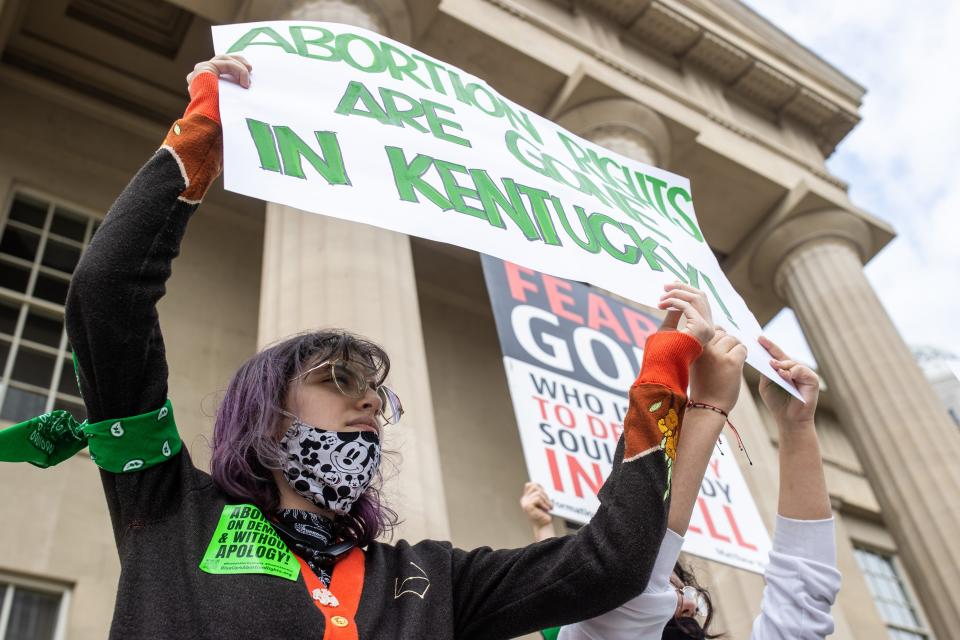Federal judge extends order halting Kentucky's new abortion law, weighs injunction
A federal judge said Monday she will rule by May 19 on whether to enter a preliminary injunction blocking parts or all of Kentucky's sweeping new "omnibus" abortion law.
Meanwhile, U.S. District Judge Rebecca Grady Jennings said she will renew for another 14 days her temporary restraining order that suspended enforcement of the law that took effect April 13.
However, Jennings said her renewed temporary order to be issued Wednesday may be modified to let some portions of the law take effect that are not in dispute. She did not elaborate.
Jennings' comments followed a hearing Monday on whether to issue an injunction against the law while legal challenges by the state's two abortion providers are pending.
At the hearing before a courtroom filled with supporters and opponents of the law, Jennings asked those present to be mindful that the subject "evokes a lot of emotion."
"The court cannot entertain any political or emotional arguments today," Jennings said.
That admonition appeared unnecessary.
The several hours of discussion that followed consisted largely of a procedural analysis of the 72-page House Bill 3.
Did Kentucky ban abortion?: Here's what to know about the state's restrictive new law
Going section by section, lawyers debated whether it is possible to enforce a law that includes extensive new reporting requirements — in some cases on government forms yet to be created — and establishment of a new bureaucracy to regulate medication abortions.
Kentucky's abortion providers, Planned Parenthood and EMW Women's Surgical Center, both in Louisville, argue the law is unconstitutional and impossible to comply with because of the many new requirements.
Through an emergency clause, the law took effect immediately April 13.
"It needs to be clear, what we are being asked to do," said lawyer Miranda Turner, representing Planned Parenthood.

But a lawyer for Kentucky Attorney General Daniel Cameron, who is defending the HB 3, said clinics could comply with many requirements by simply providing information spelled out in the new law until forms and systems are in place.
"If the form doesn't exist, you don't have to comply," Assistant Deputy Attorney General Christopher L. Thacker said.
But the two abortion providers suspended services for eight days after the law took effect, saying they feared potential enforcement actions in the law that include criminal charges, fines and loss of licenses by health professionals.
Abortion services resumed after Jennings on April 21 stopped enforcement of the law through a temporary order.
The law includes a ban on abortions after 15 weeks, outlaws mail delivery of medication to induce early abortions, imposes new restrictions on abortions for girls under 18 including those seeking permission from a judge and requires fetal remains to be buried or cremated.
For subscribers: Abortion clinic 'safety zone' violations lead to charges, but problems persist, owner says
It also requires the state to set up an extensive new bureaucracy to certify and oversee anyone who manufacturers, distributes or dispenses medication used prior to 10 weeks gestation to terminate a pregnancy. That method now accounts for about half of abortions nationwide and in Kentucky, which reported 4,104 abortions for 2020, the most recent numbers available,
Meanwhile, abortion opponents remained focused on a Mississippi case that could curtail or overturn Roe v. Wade, the 1973 landmark case that legalized the right to abortion nationwide. A ruling is expected by June.
The Mississippi case bans abortion after 15 weeks of pregnancy although the Supreme Court has allowed abortion to the point where a fetus is considered viable, generally around 24 weeks.
Kentucky added the provision banning abortion after 15 weeks so the state would have a similar law in place if the Supreme Court upholds the Mississippi law but stops short of overturning Roe v. Wade altogether.
Reach Deborah Yetter at dyetter@courier-journal.com. Find her on Twitter at @d_yetter. Support strong local journalism by subscribing today: www.courier-journal.com/subscribe.
This article originally appeared on Louisville Courier Journal: Judge hears arguments over Kentucky abortion law 2022

